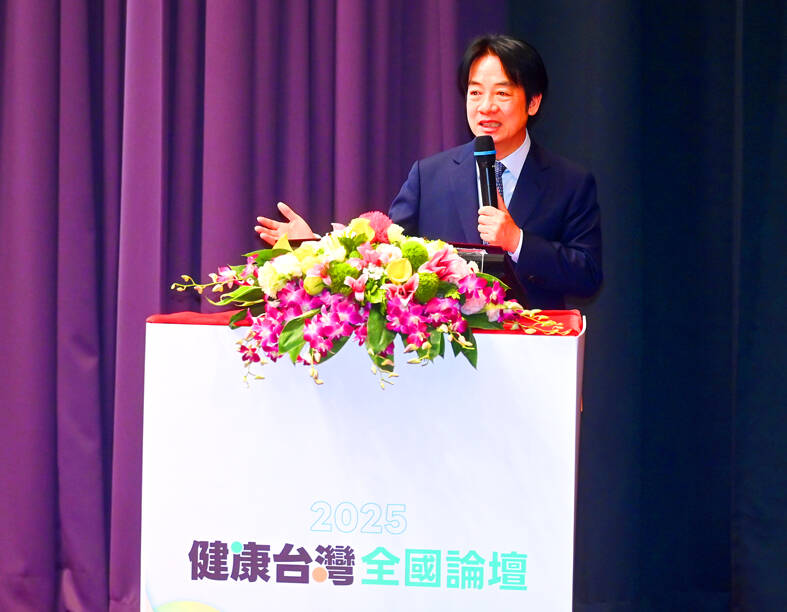A new cancer drug fund is to be maintained at a steady level, and would be supplemented each year based on its expenditure during the previous year, President William Lai (賴清德) said yesterday.
Lai made the remark during the Healthy Taiwan national forum in Taipei, during which Healthy Taiwan Promotion Committee deputy convener Chen Jyh-hong (陳志鴻) also proposed “five main pillars” for a healthy Taiwan.
The five main pillars are: preventing the “three highs” (high blood pressure, high blood sugar and high cholesterol), improving national mental health resilience, improving healthcare workers’ work conditions, implementing National Health Insurance (NHI) improvement and reforms, and ensuring the sustainability of the NHI system.

Photo: Wang Yi-sung, Taipei Times
Lai said that as the first president of Taiwan with a background in medicine, he thinks about how to bring the healthcare community together to improve the well-being of Taiwanese, helping people to become healthier and the nation to become stronger.
After the committee was established, experts and academics from various medical fields were invited to attend the meetings, he said.
The NHI budget was also increased by NT$53.1 billion (US$1.63 billion) this year, a growth of more than 6 percent, he said.
The adjustments are part of efforts to give the healthcare community sufficient funding and service capacity to take good care of patients, and improve healthcare workers’ salaries and working conditions, Lai said.
Cancer, which has consistently been the leading cause of death in Taiwan, is listed as a priority for prevention efforts, he said, adding that aside from increasing the budget for government-funded cancer screening to NT$6.8 billion this year, new screening methods were also introduced.
Regarding cancer treatment, Lai said Taiwan continues to promote precise medicine, and that while NT$5 billion has been allocated for the new cancer drug fund this year, the fund can be supplemented each year according to the actual expenditure in the previous year, ensuring that it remains at a steady level.
Some NHI mechanisms need to be adjusted, Lai said, adding that he hopes the Healthy Taiwan national forum can serve as a platform for collecting people’s opinions in improving health protection.
Meanwhile, Chen said he hopes Healthy Taiwan can be a national movement that transcends partisanship, and that the government can continue to implement the “five main pillars” to establish a healthy Taiwan.
The vision and goal of Healthy Taiwan is to help the 23.5 million people in Taiwan live longer, better and happier, so it should be a national movement that transcends partisanship, ethnicity and geographical limitations, he said.
Healthy Taiwan is supported by the Presidential Office and the central government, and has been allocated a five-year NT$48.9 billion budget, Chen said, adding that it adopts a bottom-up approach in planning and execution, so the health solutions are planned according to the area’s needs.
Taiwan’s preventable mortality, or deaths that could be avoided through effective public health and primary prevention interventions, has improved by 10 percent between 2001 and 2019, but the improvement rate is still lower than those in South Korea and Japan, he said.
Improving healthcare for people with the three-highs can help reduce preventable mortality and improve people’s overall health level, Chen said.

The manufacture of the remaining 28 M1A2T Abrams tanks Taiwan purchased from the US has recently been completed, and they are expected to be delivered within the next one to two months, a source said yesterday. The Ministry of National Defense is arranging cargo ships to transport the tanks to Taiwan as soon as possible, said the source, who is familiar with the matter. The estimated arrival time ranges from late this month to early next month, the source said. The 28 Abrams tanks make up the third and final batch of a total of 108 tanks, valued at about NT$40.5 billion

Two Taiwanese prosecutors were questioned by Chinese security personnel at their hotel during a trip to China’s Henan Province this month, the Mainland Affairs Council (MAC) said yesterday. The officers had personal information on the prosecutors, including “when they were assigned to their posts, their work locations and job titles,” MAC Deputy Minister and spokesman Liang Wen-chieh (梁文傑) said. On top of asking about their agencies and positions, the officers also questioned the prosecutors about the Cross-Strait Joint Crime-Fighting and Judicial Mutual Assistance Agreement, a pact that serves as the framework for Taiwan-China cooperation on combating crime and providing judicial assistance, Liang

A group from the Taiwanese Designers in Australia association yesterday represented Taiwan at the Midsumma Pride March in Melbourne. The march, held in the St. Kilda suburb, is the city’s largest LGBTQIA+ parade and the flagship event of the annual Midsumma Festival. It attracted more than 45,000 spectators who supported the 400 groups and 10,000 marchers that participated this year, the association said. Taiwanese Designers said they organized a team to march for Taiwan this year, joining politicians, government agencies, professionals and community organizations in showing support for LGBTQIA+ people and diverse communities. As the first country in Asia to legalize same-sex

MOTIVES QUESTIONED The PLA considers Xi’s policies toward Taiwan to be driven by personal considerations rather than military assessment, the Epoch Times reports Chinese President Xi Jinping’s (習近平) latest purge of the Chinese People’s Liberation Army (PLA) leadership might have been prompted by the military’s opposition to plans of invading Taiwan, the Epoch Times said. The Chinese military opposes waging war against Taiwan by a large consensus, putting it at odds with Xi’s vision, the Falun Gong-affiliated daily said in a report on Thursday, citing anonymous sources with insight into the PLA’s inner workings. The opposition is not the opinion of a few generals, but a widely shared view among the PLA cadre, the Epoch Times cited them as saying. “Chinese forces know full well that